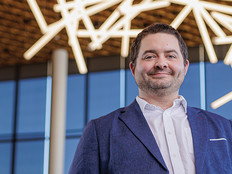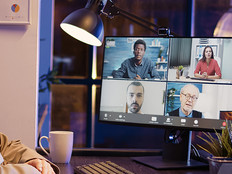Sir Tim Berners-Lee Calls for Net Neutrality on the 25th Anniversary of the Web
Twenty-five years ago this week, on March 12, 1989 — 20 years after the invention of the Internet — a software engineer at the CERN particle physics laboratory near Geneva set forth his ideas for what would become the World Wide Web.
In a document titled “Information Management: A Proposal,” Sir Tim Berners-Lee addressed issues affecting large projects at CERN: “This proposal … discusses the problems of loss of information about complex evolving systems and derives a solution based on a distributed hypertext system.
… In providing a system for manipulating this sort of information, the hope would be to allow a pool of information to develop which could grow and evolve with the organisation and the projects it describes. For this to be possible, the method of storage must not place its own restraints on the information. This is why a “web” of notes with links (like references) between them is far more useful than a fixed hierarchical system.
A year later, Berners-Lee had created the first web browser and soon had the first website and server up and running on his NeXT computer. Today, that system is on display at CERN’s Microcosm exhibit.
On it is an old sticky note that reads: “This machine is a server. DO NOT POWER IT DOWN!!
Today, Berners-Lee has a lot more than a single server on his mind (even if it is perhaps the most important server ever created). As he points out in a guest post on Google’s official blog, 40 percent of the world’s population is now online. The web has generated trillions of dollars in economic value and revolutionized how we connect and interact, transforming whole industries such as healthcare and education and helping to activate and sustain social and political movements worldwide — and that’s just skimming the surface of its impact.
“How has this happened?” asks Berners-Lee in his Google post. “By design, the underlying Internet and the WWW are nonhierarchical, decentralized and radically open. The web can be made to work with any type of information, on any device, with any software, in any language. You can link to any piece of information. You don’t need to ask for permission. What you create is limited only by your imagination.”
And he’d like to keep it that way.
To do so, he notes, it’s imperative that the web remain free and open to everyone, and that we — its users — take an active role in ensuring that. “If we want a web that is truly for everyone, then everyone must play a role in shaping its next 25 years,” he said in statement marking the web’s silver anniversary.
The Future of the Web
In his Google post, pondering the future of his invention, Berners-Lee poses many questions:
How can we ensure that the other 60 percent around the world who are not connected get online fast? How can we make sure that the web supports all languages and cultures, not just the dominant ones? How do we build consensus around open standards to link the coming Internet of Things?
Will we allow others to package and restrict our online experience, or will we protect the magic of the open web and the power it gives us to say, discover, and create anything? How can we build systems of checks and balances to hold the groups that can spy on the net accountable to the public?
Key to his vision of an unfettered web is the concept of net neutrality — the principle that all content on the Internet, regardless of the source, should be made equally accessible by service providers and government — and in support of this, Berners-Lee has exhorted users to push their governments to adopt a “digital bill of rights.”
In the United States, that starts with the Federal Communications Commission. In January, a federal appeals court struck down the FCC’s “Open Internet” rules, which barred ISPs from blocking or “unreasonably discriminating” against web content. Verizon had challenged the rules, saying they went beyond the legal purview of the FCC. In response, the commission is requesting public comments before delivering a new set of net neutrality regulations.
For his part, Berners-Lee remains optimistic. Writing on the official anniversary website, Webat25.org, he concludes, “By working together, I believe we can build a web that truly is for everyone: one that is accessible to all, from any device, and one that empowers all of us to achieve our dignity, rights and potential as humans. Let’s use this landmark birthday as a crucial step on that path.”







